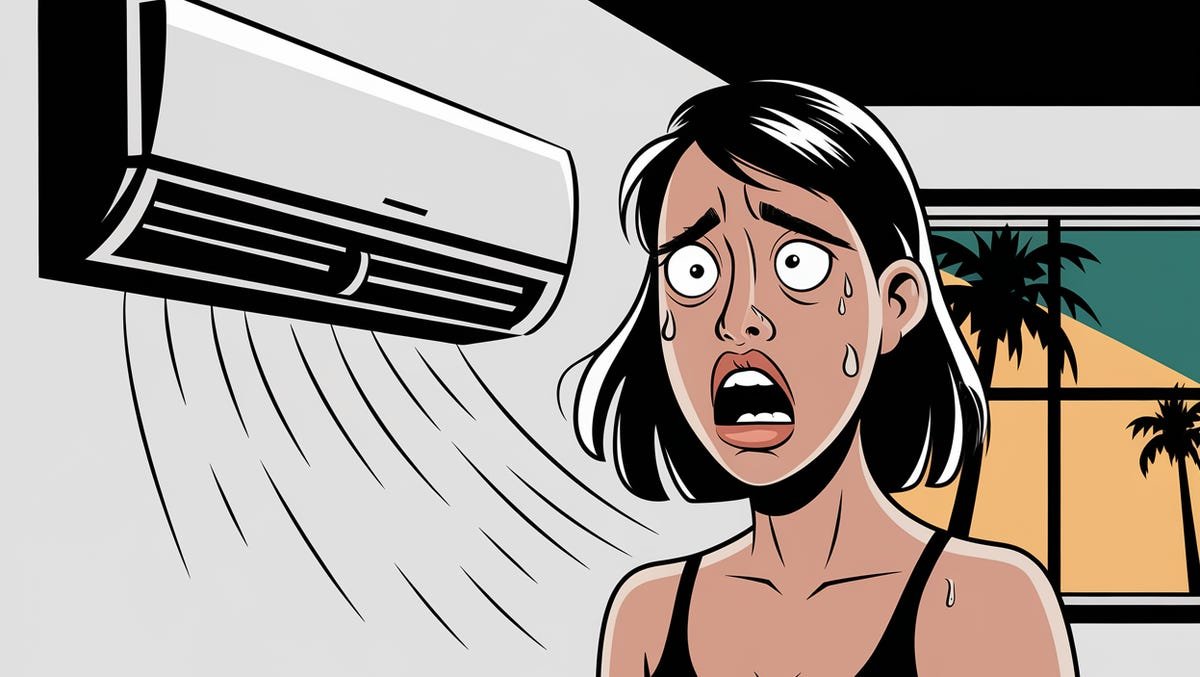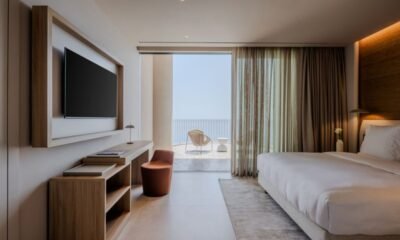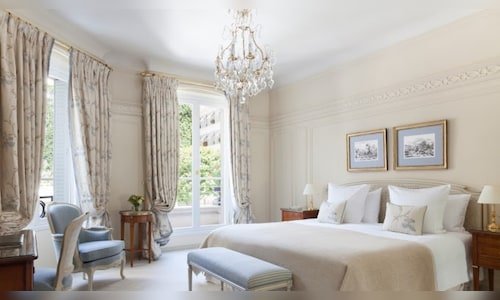Christopher Elliott
| Special to USA TODAY
10 best eco-friendly hotels
Explore the best eco-friendly hotels in the United States, as chosen by USA TODAY readers. Dscover where you can stay green during your travels.
- Hotel guests are encountering unexpected charges for amenities traditionally included in the room rate.
- The debate over what constitutes basic amenities in a hotel room is intensifying, with items like air conditioning, Wi-Fi, and daily housekeeping now under scrutiny.
- Resort fees, previously added discreetly, must now be included in the initial price quote, potentially leading to hotels adopting à la carte pricing models for amenities.
Should your hotel room include air conditioning? Victoria Holtz thinks so. Her resort in Fort Lauderdale, Florida, did not.
“The air conditioning in my room didn’t work,” recalled Holtz, a professional speaker based in Houston. “It was hot, humid, and uncomfortable.”
When she called the front desk, a representative said they couldn’t fix the AC in her room immediately, but that they could upgrade her to a suite – for a fee.
“I felt like a hostage,” she said.
Fortunately, most hotel rooms in the United States include the basics like air conditioning, heating, electricity and running water. But her experience comes at an interesting time. There’s a debate happening now in a post-resort-fee era, about what should be included in your room, and what shouldn’t.
So, what happened to Holtz? She was in South Florida to give a keynote speech, and the thought of sweating through three days was just too much. She spent the extra $120 a day on the upgrade.
Holtz says that wasn’t the worst “gotcha” she has encountered in her travels. Once, when she was staying at a chain hotel in South America, the elevator broke down. Before they let her out of the elevator, she said a hotel employee demanded a $25 fee.
“I agreed to pay it because I had to give a keynote speech,” she said. “And I was already late.”
So, what should your hotel room include? To obtain a clear answer, we need to take a closer look at how we arrived at this point. It turns out there are things your room should absolutely include, and some sneaky fees hotels have started charging. But fortunately, there are also ways of avoiding a surprise hotel rip-off.
What should be included in your hotel room?
Before we go there, let’s hit the rewind button on hotel fees.
For the last decade, many hotels have automatically charged “resort” fees to guests to cover amenities like daily newspapers, bottled water, and use of exercise facilities. Hotels believed these fees, often added after the initial price quote, were fair. Customers begged to differ. Some argued that they didn’t use all of the amenities. Others said the resort fees should have been disclosed sooner, and not at the end of the transaction, which made the room look cheaper than it was. Eventually, the government stepped in and ordered hotels to disclose the fees sooner.
The result: These fees must now be included in the initial room rate quoted by the hotel. Experts believe hotels will shift to an à la carte model of pricing to make up for the revenue lost by quoting a higher rate, which brings us to the debate about what should be included in a hotel room. And it’s a big question mark.
Before you say, “Yeah, Chris, that example about the air conditioner is over the top!” let me assure you, it isn’t.
I stayed in a vacation rental in Hawaii a few years ago where the air conditioner was locked down. For an extra fee, the owner said she would enable it. (I refused.) As I write this, I’m in an apartment in Sydney with no air conditioning, and it’s getting hot in here! Go to Europe this summer and you’ll find plenty of hotel rooms without A/C.
Far from being an extraneous discussion, the question of what is – and isn’t – included in a room may prove to be the defining debate of 2025, at least in the travel industry.
Here’s what every hotel should give you – no questions asked
When you book a hotel room, I believe there are certain things you should never have to pay extra for. I’m not including electricity, heat and running water (and also, hot water) since a vast majority of hotels already include these.
Here are the basics – the non-negotiables that make your stay comfortable and functional.
- Reliable Wi-Fi: In 2025, Wi-Fi isn’t a luxury; it’s a necessity. Whether you’re traveling for work or streaming a movie to unwind, a strong internet connection should be a given. “Charging for Wi-Fi feels like a money grab,” said Steve Torres, a travel advisor. “It’s especially frustrating when budget hotels include it for free, but higher-end properties don’t.”
- Daily housekeeping: Post-pandemic, many hotels scaled back housekeeping to “on-demand” services. But let’s be real: most guests expect their rooms to be cleaned daily. It’s OK to incentivize guests to decline daily housekeeping by giving them points or an amenity, but charging them extra to clean the room is wrong. “Daily housekeeping is a must,” said Sylvia Lebovitch, a travel advisor with OvationNetwork. “For most of my clients, it is not about the actual dollar cost, but more about the feeling of being nickel and dimed.”
- Potable water: You know, I thought this one was settled, but apparently not. Make sure your guests have drinkable water. It doesn’t have to be Fillico Jewelry Water, just clean water that you can drink. That’s especially important when the tap water is undrinkable. Ellen Flowers recently stayed in a Las Vegas resort with “over the top” amenities. But the bottled water costs extra. “I couldn’t help but feel frustrated when I found that water wasn’t included in the room rate,” said Flowers, the travel editor for a fashion website.
- Basic toiletries and towels: Soap, shampoo, and towels should never cost extra. “Some things in a hotel room should just be a given,” said Darragh McGillicuddy, managing director of McGillicuddy Hospitality, a consulting firm. “They’re what I’d call the hygiene factors.”
What about the rest?
As you can probably imagine, that leaves a lot of things that hotels could charge you for. And some are likely to annoy you.
Like parking fees.
Edward Winrow, a retired city worker from Calabasas, California, has noticed them pop up in all kinds of places, including some mid-range chain hotels. He thinks they’re wrong, especially when you have a disability. However, repeated emails sent to the hotels have yielded the same response: We charge for parking, regardless of whether you have a disability or not.
“There should be no charge for handicap spaces, or at least a discounted cost,” he said. “There is no extra charge for an accessible room, why then an accessible parking space?”
Then there’s tea and coffee, which has typically been included in the room. But when Andy Ellis checked into a luxury hotel in Glasgow recently, it wasn’t.
“When I checked out, they handed me a bill for tea, coffee, milk, and sugar,” recalled Ellis, a managing director for a shower manufacturer in Morecambe, England. “I was absolutely shocked.”
The point is that hotels are getting creative with their surcharges. Parking and hot beverages are just two examples of what hotels could start charging for. And some already are, which is why your hotel stay may feel like a real rip-off this summer.
The fix? Assume nothing is included in the hotel rate you pay, except the basics like electricity or running water. Always ask before you help yourself to the tea, coffee or the contents of the minibar. Check for a “Complimentary” sticker on the bottle of water to make sure it doesn’t cost extra.
This summer, hotels are trying to make up for the revenue they lost when they had to start telling the truth about their prices. And if you’re not careful, you could end up paying a high price for it.
Christopher Elliott is an author, consumer advocate, and journalist. He founded Elliott Advocacy, a nonprofit organization that helps solve consumer problems. He publishes Elliott Confidential, a travel newsletter, and the Elliott Report, a news site about customer service. If you need help with a consumer problem, you can reach him here or email him at chris@elliott.org.





































You must be logged in to post a comment Login